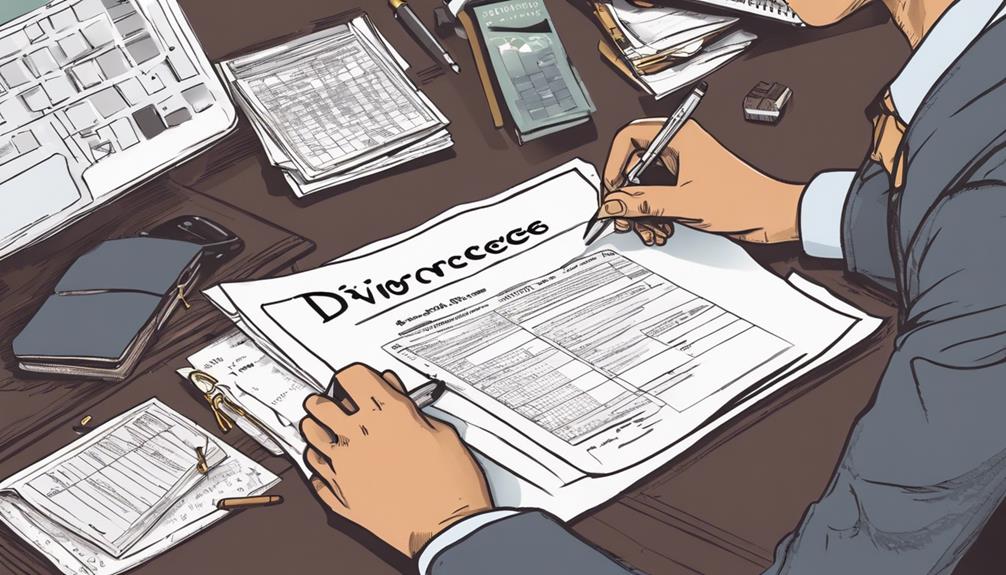Have you ever thought about the important steps needed to get a divorce in Georgia? Understanding the legal requirements and procedures for the divorce process is crucial for ensuring a smoother transition.
In this guide, we break down the seven key steps that individuals need to take to navigate the divorce proceedings in Georgia effectively. From the initial stages of filing paperwork to the final decisions regarding legal representation, each step plays a vital role in ensuring a successful outcome.
Key Takeaways
- Selecting a specialized Georgia divorce attorney ensures proper legal guidance.
- Understanding the divorce process in Georgia aids in informed decision-making.
- Adhering to legal procedures and documentation is crucial for a smooth divorce process.
- Considering settlement options versus trial decisions impacts the outcome of the divorce case.
Finding a Divorce Attorney
When beginning the process of getting a divorce in Georgia, finding a divorce attorney who specializes in Georgia divorce laws is crucial to ensure proper guidance and representation.
A Georgia divorce lawyer can provide valuable legal advice on various aspects of family law, including the division of assets and spousal support. They can assist in negotiation settlements and offer court representation if necessary.
It's essential to choose an attorney who not only understands your goals but also has a proven track record of success in handling cases similar to yours. Effective communication skills are paramount in this process, as clear communication between you and your attorney is key to achieving the desired outcomes.
Determining Divorce Type

Understanding the distinction between contested and uncontested divorce types is essential for navigating the divorce process efficiently in Georgia. Here are three key points to help you grasp the differences:
- Uncontested Divorce: In this type of divorce, both spouses reach an agreement on all issues, including child custody, alimony, and property division. Uncontested divorces are typically quicker, more cost-effective, and less emotionally taxing.
- Contested Divorce: Contrary to uncontested divorces, contested divorces involve disagreements that may require a trial. If spouses can't agree on crucial matters, such as child custody or the division of assets, the court will step in to make decisions on their behalf.
- Legal Process in Georgia: Whether you opt for a contested or uncontested divorce, understanding the legal process in Georgia is crucial. Knowing the intricacies of divorce proceedings in the state can help you make informed decisions and move forward with clarity.
Filing for Divorce
To initiate the divorce process in Georgia, we must file a petition with the Superior Court of the county where either spouse currently resides. Filing for divorce involves completing specific court forms and paying the necessary fees. Even if your spouse lives out of state or has recently moved, you can still file for divorce in your county. Some counties in Georgia provide online filing options for added convenience. It is vital to ensure that the divorce documents are properly served to your spouse according to Georgia law.
| Filing Process | Information Needed | Online Options Available? |
|---|---|---|
| Complete court forms | Personal details, grounds for divorce | Yes |
| Submit forms and pay fees | County residency information | Varies by county |
| Serve divorce documents properly | Spouse's current address | Not guaranteed |
Understanding the residency requirement, the process of filing the complaint, and utilizing online divorce services can help streamline an uncontested divorce. Grounds for divorce in Georgia should also be clearly stated in the initial filing to ensure a smooth legal process.
Serving Divorce Papers

After completing the filing process for a divorce in Georgia, the next crucial step is serving the divorce papers to the spouse to inform them about the legal proceedings. Serving divorce papers is a critical aspect of the divorce process, ensuring that both parties are aware of the legal actions being taken.
Here are three key points to consider when serving divorce papers:
- Personal Service Requirement: Georgia law mandates that divorce papers must be personally served to the spouse. This ensures proper notification and adherence to legal procedures.
- Methods of Service: Divorce papers can be served by a sheriff, a process server, or through alternative methods approved by the court. Each method has its own set of rules and requirements.
- Importance of Acknowledgment: Obtaining an Acknowledgment of Service, where the spouse acknowledges receipt of the papers, is crucial. This document serves as confirmation of the informal service agreement and is essential for the legal process to proceed smoothly.
Initiating Discovery Process
Let's delve into the process of initiating discovery in a divorce case to gather essential evidence and information.
In Georgia, after filing for divorce based on legal grounds and serving the divorce complaint, parties can begin the discovery process. This stage of the divorce process allows for the exchange of documents and information through methods such as interrogatories and requests for production.
The discovery process is crucial as it helps uncover key details like assets, liabilities, income, and expenses, which are essential for reaching a fair resolution. Depositions, where parties provide sworn testimony outside of court, may also be conducted during this phase.
Discovery plays a vital role in preparing for negotiations, settlements, or trial in a divorce case. Whether dealing with uncontested divorces or navigating the complexities of a no-fault divorce, engaging in the discovery process can provide the necessary information to move forward effectively.
Considering Trial Options

As we navigate the complexities of divorce proceedings, it's crucial to weigh the decision between going to trial or seeking a settlement. Understanding the legal representation options available to you can significantly impact the outcome of your case.
We'll explore the nuances of a divorce trial and the factors to consider when making this important choice.
Trial Vs. Settlement
Choosing between a trial and settlement in a divorce case in Georgia requires careful consideration of the costs, time commitment, and emotional impact of each option. When deciding on the best approach for your situation, keep in mind the following:
- Trial: Involves presenting evidence, witness testimonies, and legal arguments in court.
- Settlement: Often entails negotiation between spouses with the assistance of attorneys or mediators.
- Judge: Trials leave the final decisions to a judge, while settlements offer more control over the outcome.
Each option has its pros and cons, so it's crucial to weigh them against your priorities and circumstances before proceeding with either a trial or a settlement.
Legal Representation Options
Considering legal representation options for a divorce trial in Georgia involves critical decision-making to ensure effective guidance and protection of your rights.
During a divorce trial, complex legal issues may arise, making it essential to have a knowledgeable divorce attorney by your side. Your attorney will play a crucial role in preparing and presenting evidence, navigating the trial process, including jury selection and witness testimonies.
The right attorney can significantly impact the outcome of your case, advocating for your interests and working towards a favorable resolution. With their expertise, they can ensure that your rights are protected and that your voice is heard throughout the divorce trial proceedings.
Securing Experienced Legal Representation

Securing experienced legal representation for your divorce proceedings in Georgia is crucial for navigating the complexities of the legal process effectively. Here are three key reasons why hiring an experienced divorce attorney is essential:
- Insights into Legal Complexities: An experienced attorney can provide valuable insights into the legal complexities specific to your case, offering you a clearer understanding of the proceedings ahead.
- Guidance Through Paperwork and Logistics: Navigating the paperwork and logistics involved in the divorce process can be overwhelming. A skilled attorney can guide you through these tasks efficiently, ensuring nothing is overlooked.
- Advocacy for Favorable Resolution: Choosing the right attorney with relevant experience can significantly impact the outcome of your divorce case. An experienced attorney will advocate for your best interests, working diligently towards achieving a favorable resolution in your divorce.
With their support and guidance, you can approach the process with confidence and assurance.
Frequently Asked Questions
What Are the Steps to Divorce in Georgia?
We file a divorce petition first in Georgia. Next, we create a complaint outlining grounds and key issues. Then, we serve divorce papers following Georgia law. Responding involves addressing allegations and potentially filing a counterclaim. Discovery gathers evidence.
Do I Need a Lawyer to File for Divorce in Georgia?
While not required, having a lawyer for a divorce in Georgia can safeguard rights and ensure legal procedures are correct. Guidance on complex issues is vital, especially for disputes like child custody or asset division.
What Is the 10 Year Divorce Rule in Georgia?
We understand the 10-year divorce rule in Georgia. It governs the division of retirement benefits exceeding 10 years' worth earned during marriage. Knowing this helps spouses handle asset distribution effectively, ensuring fair outcomes in divorce proceedings.
What Are the 13 Grounds for Divorce in the State of Georgia?
We understand the importance of knowing the 13 grounds for divorce in Georgia. They range from adultery to mental incapacity. Proof and understanding these grounds are crucial for making informed decisions about ending a marriage.
Conclusion
In conclusion, navigating the process of divorce in Georgia can be a challenging journey, but with the right guidance and support, it can also be a transformative experience.
By following the 7 steps outlined in this comprehensive guide, individuals can embark on a path towards a new chapter in their lives with confidence and clarity.
Remember, seeking legal representation during this time can provide invaluable assistance and peace of mind.










